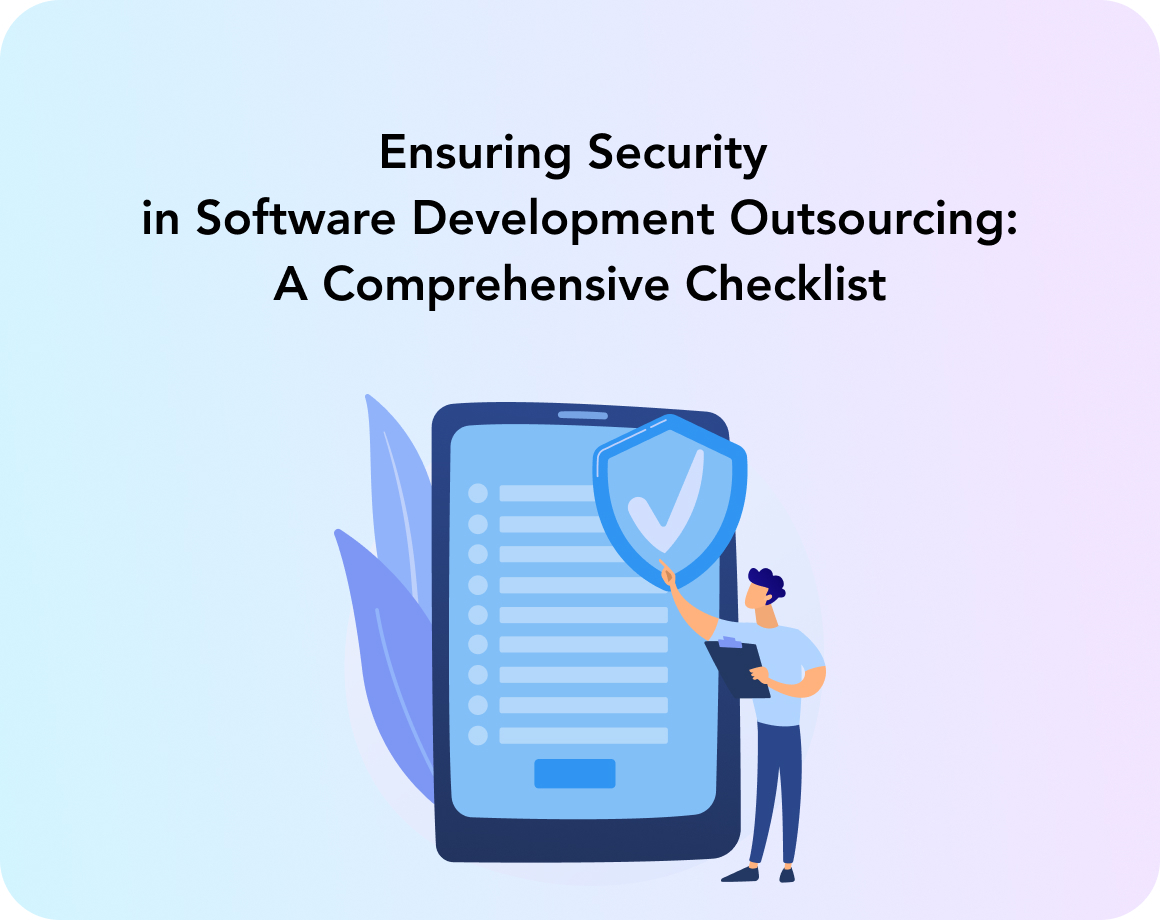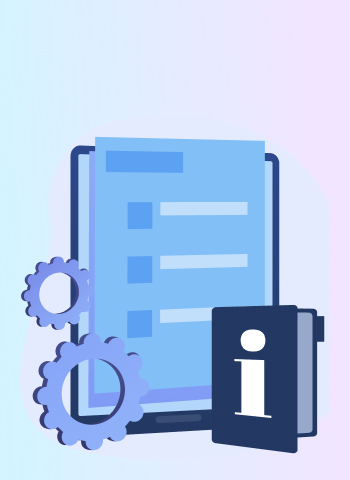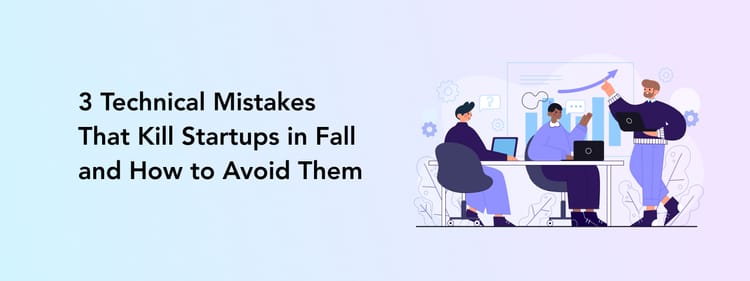Quality is the most important parameter for outsourced software for many clients. Makes sense: getting high-quality, reliable software is the reason businesses contact professional software developers in the first place.
At the same time, a well-working digital product doesn't mean it’s secure from cyberattacks, and the development team didn’t misuse some of your sensitive data. That’s why double-checking software’s security is as important as guaranteeing its functionality.
This article explains the possible risks connected with software outsourcing security and gives clear guidance on how to choose a trustworthy development team. At the end of the article, you will find a free checklist for security in software development outsourcing.
Why Care About Security When Outsourcing Software Development?
Quality assurance development stage, extensive testing, continuous code reviews, and NDAs might seem like unnecessary time and money spent for some companies.
Think about this: 72% of web application vulnerabilities occur due to code flaws. Poor security measures during the development stage openly invite criminals to benefit from vulnerabilities.
What’s more, the lack of security in software development outsourcing is risky because
- Unreliable teams can leak your sensitive data: Be it on purpose or accidentally, a team that doesn’t worry much about cybersecurity can expose your company’s sensitive data and lure in cybercriminals willing to benefit from it.
- Your project’s source code can be reused in another software: Development teams that don’t care about their reputation and client satisfaction can reuse some parts of your project’s code for other clients. No need to say that it opens the way for vulnerabilities and data exposure.
- Third parties can access your source code: An inexperienced development team can use suspicious APIs and libraries that can leak their clients’ data online.
If these arguments do not seem enough, let’s talk money: the average cost of a data breach in 2023 reached $4.45 million, with a 15% increase over 3 years. That’s why 51% of organizations are planning to increase their cybersecurity investments.
How to Understand Your Software Outsourcing Team is Reliable
While it’s clear that an irresponsible software development team can be a serious threat to your product’s security, understanding whether you can trust a particular software development company or not can be a tricky task. Let’s review the top security green flags for an outsourcing software development company.
Shares the code with you
Even if you request a turnkey solution and expect to see the final product only, it doesn’t mean that the software’s code should be a mystery. A reliable and transparent development team will give the necessary access to the project’s repositories. Thus, you can track the programmer’s progress or check the quality with an independent expert if needed.
Regularly perform code reviews
Low software quality makes it prone to vulnerabilities. A development team that cares about its product’s quality and safety will perform regular code reviews to ensure its functionality and security.
A code review is a process when a programmer checks the code of a colleague before merging the chunk with the rest of the project’s code. This practice helps eliminate mistakes in the process and streamline quality assurance early on.
Use well-known and secure third-party software
It’s hard to imagine a software development project that doesn’t require any third-party software. Payment systems, cloud storages, databases, libraries, and APIs all access the project’s data. In the best-case scenario, third-party software from unknown sources can create security gaps in the source code. Worse case, these can contain malware.
Always ask your team to share all the integrations they are making and check online for their sources. Even better, ask the team to share their suggestions for third-party integrations in the proposal before signing a contract.
Has set security standards
Shots in the dark are never a good option for setting up product security. A development team that emphasizes the security of its products will have protocols and standards to ensure consistent security no matter what.
Usually, a development team would create a checklist for developers and QA specialists to assess the product’s security. Plus, developers should base their processes on the company’s guidelines and frameworks for secure software development.
Ask your potential software development partner about the encryptions they use, their development environments and repositories, code access controls, third-party software policies, and so on.
Educates you and your team on how to protect your software
When it comes to digital product security, all the responsibility doesn’t fall on the development team. You, as a client, will also overlook the proper use and maintenance of your software. A responsible development company will explain all the dos and don'ts of using your new product to you and your team.
Plus, your software development partner can conduct a workshop to share the basic principles of cybersecurity at the workplace, like how to protect login credentials.
Knows security policies
When creating new software, the development team needs to be aware of the common security policies as well as regional and industry security regulations.
For example, in Europe, private data is protected by GDPR (General Data Protection Regulation), while in the US, it’s a whole range of various laws specific to the state. The medical software in the US needs to be HIPAA-compliant, while fintech products have to adhere to several regulations, including AML (Anti-Money Laundering).
Developers should take these regulations into account to create a legal and, more importantly, fully secure product.
Offers maintenance services
As surprising as it may sound, the software development process often doesn’t finish when the last line of code is written, or even the product is released. Proper maintenance is a must in the long run.
Perpetio prioritizes security in every software development project.
Unfortunately, any software gets outdated and more prone to vulnerabilities. Cybercriminals are actively working to find new ways of stealing data, so bringing your software up to date with the current security standards is simply a necessity for keeping it safe.
Has security certifications
An absolute green flag for an outsourced development team is a security certificate that proves that their processes are up to date with the current security protocols. One of such certifications is ISO/IEC 27001. It’s an international standard of information security, cybersecurity, and privacy protection. A development team having this certification guarantees that the software they create corresponds with the existing security best practices.
Software Outsourcing Team Red Flags
Now that you know what to look for in outsourced development partner candidates, let’s talk about some big no-nos you might notice in the interview.
No established quality assurance process
If your question about QA services is left unanswered, chances are the development team doesn’t have a dedicated quality assurance process, including security testing. Code reviewing is a useful practice, but it alone is not enough to ensure that there are no security gaps. Skipping a QA development stage can result in big financial and reputational losses for the client if a missed design flaw or code gap is discovered by cybercriminals.
Unclear security policies
To protect your software and private data from potential threats, your development team has to base their security measures on a set list of standards and policies that cover all the security areas. For example, you should ask how the team protects their code repositories, cloud storage, and computers from leaks. If the team is unable to articulate and provide details about their security measures, it raises concerns about their commitment to protecting your software and sensitive data.
Don’t want to sign an NDA
An NDA (Non-disclosure agreement) is your safety card in terms of data privacy and a guarantee that your company’s information won’t spread beyond the essential development team members. An NDA is a standard practice to protect sensitive information and intellectual property. A reliable development team should be open to signing an NDA as a sign of their commitment to safeguarding your project details.
Don’t share repositories with you
If the development team is reluctant to share access to project repositories, it might indicate a lack of openness or potential security concerns. Access to repositories allows you to monitor progress, verify code quality, and conduct independent assessments if necessary.
Security Checklist for Software Development Outsourcing
To summarize the main security green flags for an outsourced software development team, we prepared a checklist you can use to evaluate a potential software development outsourcing partner.
Code Sharing and Collaboration
- Ensure the development team is willing to share access to the project's code repositories.
- Confirm that the team conducts regular code reviews to maintain code quality and identify potential security vulnerabilities.
Third-Party Integrations
- Verify that the team uses well-known and secure third-party libraries, APIs, and other integrations.
Security Standards and Practices
- Check if the team has established security standards for encryption, password management, and other crucial security practices.
Client Education and Collaboration
- Assess whether the team provides educational sessions to help clients and their teams understand and implement security best practices.
- Confirm that the team facilitates knowledge transfer regarding the proper use and maintenance of the software for enhanced security.
Compliance and Regulations
- Ensure the team is knowledgeable about data protection policies and adheres to relevant security regulations.
Maintenance and Support
- Verify that the team provides ongoing maintenance services to address potential security vulnerabilities and keep the software up to date.
Certifications
- Check if the team holds security certifications, such as ISO 27001, as evidence of compliance with international security standards.
Consider Perpetio Your Trusted Partner
This checklist is based on our experience at Perpetio: we take security seriously in our software development outsourcing. We follow all the secure software development best practices – from having our own high-security standards to sharing our work with clients openly through code repositories. We make sure to regularly check our code, use safe tools, and stick to important rules to keep your projects secure.
Let's collaborate to make your software development journey secure and successful!





